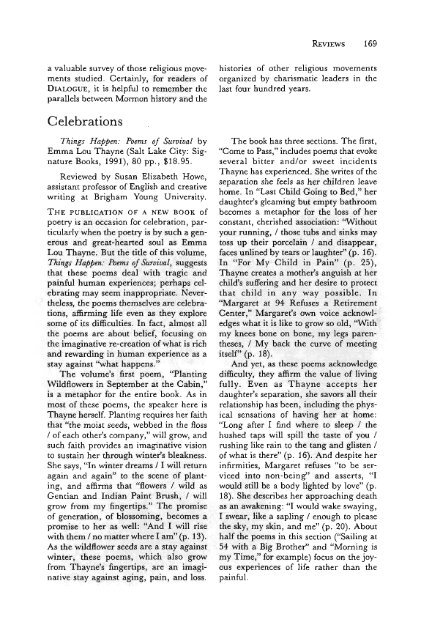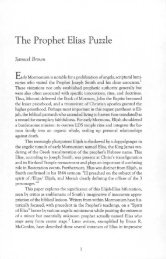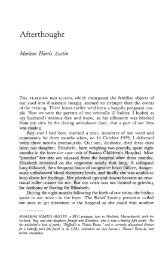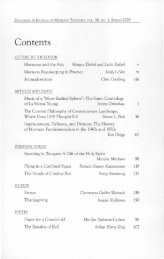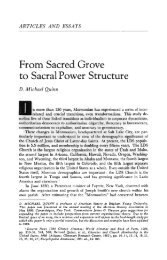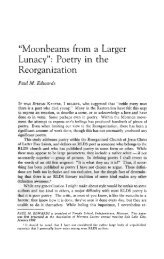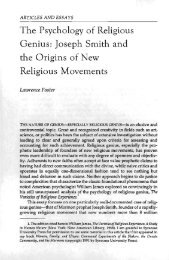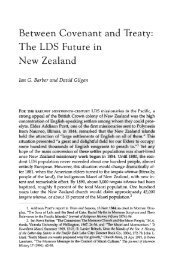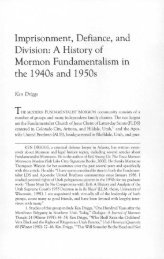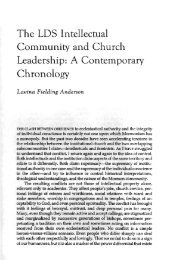Dialogue, Volume 25, Number 2 - Dialogue – A Journal of Mormon ...
Dialogue, Volume 25, Number 2 - Dialogue – A Journal of Mormon ...
Dialogue, Volume 25, Number 2 - Dialogue – A Journal of Mormon ...
Create successful ePaper yourself
Turn your PDF publications into a flip-book with our unique Google optimized e-Paper software.
REVIEWS 169<br />
a valuable survey <strong>of</strong> those religious movements<br />
studied. Certainly, for readers <strong>of</strong><br />
DIALOGUE, it is helpful to remember the<br />
parallels between <strong>Mormon</strong> history and the<br />
Celebrations<br />
Things Happen: Poems <strong>of</strong> Survival by<br />
Emma Lou Thayne (Salt Lake City: Signature<br />
Books, 1991), 80 pp., $18.95.<br />
Reviewed by Susan Elizabeth Howe,<br />
assistant pr<strong>of</strong>essor <strong>of</strong> English and creative<br />
writing at Brigham Young University.<br />
THE PUBLICATION OF A NEW BOOK <strong>of</strong><br />
poetry is an occasion for celebration, particularly<br />
when the poetry is by such a generous<br />
and great-hearted soul as Emma<br />
Lou Thayne. But the title <strong>of</strong> this volume,<br />
Things Happen: Poems <strong>of</strong> Survival, suggests<br />
that these poems deal with tragic and<br />
painful human experiences; perhaps celebrating<br />
may seem inappropriate. Nevertheless,<br />
the poems themselves are celebrations,<br />
affirming life even as they explore<br />
some <strong>of</strong> its difficulties. In fact, almost all<br />
the poems are about belief, focusing on<br />
the imaginative re-creation <strong>of</strong> what is rich<br />
and rewarding in human experience as a<br />
stay against "what happens."<br />
The volume's first poem, "Planting<br />
Wildflowers in September at the Cabin,"<br />
is a metaphor for the entire book. As in<br />
most <strong>of</strong> these poems, the speaker here is<br />
Thayne herself. Planting requires her faith<br />
that "the moist seeds, webbed in the floss<br />
/ <strong>of</strong> each other's company," will grow, and<br />
such faith provides an imaginative vision<br />
to sustain her through winter's bleakness.<br />
She says, "In winter dreams / I will return<br />
again and again" to the scene <strong>of</strong> planting,<br />
and affirms that "flowers / wild as<br />
Gentian and Indian Paint Brush, / will<br />
grow from my fingertips." The promise<br />
<strong>of</strong> generation, <strong>of</strong> blossoming, becomes a<br />
promise to her as well: "And I will rise<br />
with them / no matter where I am" (p. 13).<br />
As the wildflower seeds are a stay against<br />
winter, these poems, which also grow<br />
from Thayne's fingertips, are an imaginative<br />
stay against aging, pain, and loss.<br />
histories <strong>of</strong> other religious movements<br />
organized by charismatic leaders in the<br />
last four hundred years.<br />
The book has three sections. The first,<br />
"Come to Pass," includes poems that evoke<br />
several bitter and/or sweet incidents<br />
Thayne has experienced. She writes <strong>of</strong> the<br />
separation she feels as her children leave<br />
home. In "Last Child Going to Bed," her<br />
daughter's gleaming but empty bathroom<br />
becomes a metaphor for the loss <strong>of</strong> her<br />
constant, cherished association: "Without<br />
your running, / those tubs and sinks may<br />
toss up their porcelain / and disappear,<br />
faces unlined by tears or laughter" (p. 16).<br />
In "For My Child in Pain" (p. <strong>25</strong>),<br />
Thayne creates a mother's anguish at her<br />
child's suffering and her desire to protect<br />
that child in any way possible. In<br />
"Margaret at 94 Refuses a Retirement<br />
Center," Margaret's own voice acknowledges<br />
what it is like to grow so old, "With<br />
my knees bone on bone, my legs parentheses,<br />
/ My back the curve <strong>of</strong> meeting<br />
itself" (p. 18).<br />
And yet, as these poems acknowledge<br />
difficulty, they affirm the value <strong>of</strong> living<br />
fully. Even as Thayne accepts her<br />
daughter's separation, she savors all their<br />
relationship has been, including the physical<br />
sensations <strong>of</strong> having her at home:<br />
"Long after I find where to sleep / the<br />
hushed taps will spill the taste <strong>of</strong> you /<br />
rushing like rain to the tang and glisten /<br />
<strong>of</strong> what is there" (p. 16). And despite her<br />
infirmities, Margaret refuses "to be serviced<br />
into non-being" and asserts, "I<br />
would still be a body lighted by love" (p.<br />
18). She describes her approaching death<br />
as an awakening: "I would wake swaying,<br />
I swear, like a sapling / enough to please<br />
the sky, my skin, and me" (p. 20). About<br />
half the poems in this section ("Sailing at<br />
54 with a Big Brother" and "Morning is<br />
my Time," for example) focus on the joyous<br />
experiences <strong>of</strong> life rather than the<br />
painful.


